Mükemmeliyetçilik ve Yaratıcılık Arasındaki İlişkinin İncelenmesi
DOI:
https://doi.org/10.33308/26674874.2024382600Anahtar Kelimeler:
Mükemmeliyetçilik- Uyumlu Mükemmeliyetçilik- Uyumsuz Mükemmeliyetçilik- YaratıcılıkÖzet
Mükemmeliyetçiliğin çok boyutlu doğası ile psikolojik özellikleri, yaratıcılık kavramının, mükemmeliyetçiliğin iki farklı boyutu tarafından etkilenebileceğini düşündürmektedir. Bu çalışmanın amacı, uyumlu ve uyumsuz mükemmeliyetçiliğin yaratıcılık üzerindeki potansiyel yordayıcı etkilerini araştırmaktır. Çalışma grubunu İstanbul'da bir devlet üniversitesine devam eden 151 üniversite öğrencisi oluşturmuştur. Veri toplama aracı olarak katılımcılara APS Mükemmeliyetçilik Ölçeği ve Marmara Yaratıcı Düşünme Eğilimleri Ölçeği uygulanmıştır. Elde edilen bulgular, uyumlu mükemmeliyetçilik ile yaratıcılık arasında anlamlı ve olumlu bir ilişki olduğunu ortaya koymuştur. Öte yandan uyumsuz mükemmeliyetçilik ile yaratıcılık arasındaki ilişki ile uyumsuz mükemmeliyetçilik ile uyumlu mükemmeliyetçilik arasındaki ilişki anlamlı ve olumsuzdur. Regresyon analizinde, uyumlu mükemmeliyetçiliğin yaratıcılığı pozitif ve anlamlı bir şekilde yordadığı (ß=.40; p<0.01), uyumsuz mükemmeliyetçiliğin ise yaratıcılığı olumsuz yönde anlamlı bir şekilde yordadığı bulunmuştur
İndirmeler
Referanslar
Ahmetoglu, G., Harding, X., Akhtar, R., & Chamorro-Premuzic, T. (2015). Predictors of creative achievement: Assessing the impact of entrepreneurial potential, perfectionism and employee engagement. Creativity Research Journal, 27(2), 198–205. https://doi.org/10.1080/10400419.2015.1030293 DOI: https://doi.org/10.1080/10400419.2015.1030293
Alencar, E. M. L. S., Fleith, D. S., & Pereira, N. (2017). Creativity in higher education: Challenges and facilitating factors. Trends in Psychology, 25(2), 553-561. https://doi.org/10.9788/tp2017.2-09 DOI: https://doi.org/10.9788/TP2017.2-09
Amabile, T. M. (1996). Creativity in context: Update to the social psychology of creativity. Boulder.
Antonietti, A. (2012). Analogy-based learning. In Seel, N. M. (Ed.), Encyclopedia of the Sciences of Learning (pp. 235–237). Springer. https://doi.org/10.1007/978-1-4419-1428-6_12 DOI: https://doi.org/10.1007/978-1-4419-1428-6_11
Antonietti, A., & Colombo, B. (2012). Measurement of Creativity. In: Seel, N.M. (Ed.), Encyclopedia of the Sciences of Learning (pp. 2140–2143). Springer, Boston, MA. https://doi.org/10.1007/978-1-4419-1428-6_12 DOI: https://doi.org/10.1007/978-1-4419-1428-6_12
Ashby, J. S., & Rice, K. G. (2002). Perfectionism, dysfunctional attitudes and self-esteem: A structural equations analysis. Journal of Counseling and Development, 80(2), 197–203. https://doi.org/10.1002/j.1556-6678.2002.tb00183.x DOI: https://doi.org/10.1002/j.1556-6678.2002.tb00183.x
Baran-Lucarz, M. (2013). Perfectionism and language anxiety. Acta Universitatis Wratislavensis, 51, 107-120.
Beghetto, R. A., & Kaufman, J. C. (2013). Fundamentals of creativity. Educational Leadership, 70(5), 10-15.
Bierly, P. E., Kolodinsky, R. W., & Charette, B. J. (2009). Understanding the complex relationship between creativity and ethical ideologies. Journal of Business Ethics, 86(1), 101–112. https://doi.org/10.1007/s10551-008-9837-6 DOI: https://doi.org/10.1007/s10551-008-9837-6
Burns, L. R., & Fedewa, B. A. (2005). Cognitive styles: Links with perfectionistic thinking. Personality and Individual Differences, 38, 103–113. https://doi.org/10.1016/j.paid.2004.03.012 DOI: https://doi.org/10.1016/j.paid.2004.03.012
Büyüköztürk, Ş. (2017). Sosyal bilimler için veri analiz kitabı. Pegem Akademi DOI: https://doi.org/10.14527/9789756802748
Cabra, J. F., & Uribe-Larach, D. (2013). Creative behavior. In E. G. Carayannis (Ed.), Encyclopedia of creativity, invention, innovation and entrepreneurship, (pp. 266-271). Springer. DOI: https://doi.org/10.1007/978-1-4614-3858-8_7
Chang, E. C. (2006). Conceptualization and measurement of adaptive and maladaptive aspects of performance perfectionism: Relations to personality, psychological functioning and academic achievement. Cognitive Therapy and Research, 30, 677-697. https://doi.org/10.1007/s10608-006-9060 DOI: https://doi.org/10.1007/s10608-006-9060-7
Chou, C. C., Huang, M. Y., Lin, T. W., Lu, F. J. H., Chiu, Y. H., & Chen, J. F. (2019) Moderating effect of self-esteem on the relationship between perfectionism and creative thinking among collegiate dancers. Creativity Research Journal, 31(2), 188-197. https://doi.org/10.1080/10400419.2019.1606620 DOI: https://doi.org/10.1080/10400419.2019.1606620
Comerchero, V., & Fortugno, D. (2013). Adaptive perfectionism, maladaptive perfectionism and statistics anxiety in graduate psychology students. Psychology Learning and Teaching, 12(1), 4-11. https://doi.org/10.2304/plat.2013.12.1.4 DOI: https://doi.org/10.2304/plat.2013.12.1.4
Cropley, A. (2006a) In praise of convergent thinking. Creativity Research Journal, 18(3), 391-404. https://doi.org/10.1207/s15326934crj1803_13 DOI: https://doi.org/10.1207/s15326934crj1803_13
Cropley, A. J. (2006b). Creativity: A social approach. Roeper Review, 28(3), 125-130. https://doi.org/10.1080/02783190609554351 DOI: https://doi.org/10.1080/02783190609554351
Drolet, L., Volais, P., Forget, J., & Caron, P. O. (2014). Perfectionism and academic achievement in a sample of children from a regular school program context. In C. Pracana, (Eds.), Psychology Applications and Developments (pp. 193-201). Science Press.
Erozkan, A. (2016). Understanding the role of dimensions of perfectionism on anxiety sensitivity. Universal Journal of Educational Research, 4(7), 1652-1659. https://doi.org/10.13189/ujer.2016.040717 DOI: https://doi.org/10.13189/ujer.2016.040717
Eysenck, M. W. (1979). Anxiety, learning and memory: A reconceptualization. Journal of Research in Personality, 13(4), 363–385. DOI: https://doi.org/10.1016/0092-6566(79)90001-1
Eum, K., & Rice, K. G. (2011). Test anxiety, perfectionism, goal orientation and academic performance. Anxiety, Stress and Coping, 24, 167–178. https://doi.org/10.1080/10615806.2010.488723 DOI: https://doi.org/10.1080/10615806.2010.488723
Eusanio, E., Thomson, P., & Jaque, S. V. (2014). Perfectionism, shame and self-concept in dancers: A mediation analysis. Journal of Dance Medicine and Science, 18(3), 106–114. https://doi.org/10.12678/1089-313x.18.3.106 DOI: https://doi.org/10.12678/1089-313X.18.3.106
Fletcher, K. L., & Neumeister, K. L. S. (2012). Research on perfectionism and achievement motivation: Implications for gifted students. Psychology in the Schools, 49(7), 668-677. https://doi.org/10.1002/pits.21623 DOI: https://doi.org/10.1002/pits.21623
Flett, G. L., & Hewitt, P. L. (2006). Positive versus negative perfectionism in psychopathology comment on Slade and Owens’s dual process model. Behavior Modification, 30(4), 472-495. https://doi.org/10.1177/0145445506288026 DOI: https://doi.org/10.1177/0145445506288026
Frost, R. O., Marten, P., Lahart, C., & Rosenblate, R. (1990). The dimensions of perfectionism. Cognitive Therapy and Research, 14(5), 449-468. DOI: https://doi.org/10.1007/BF01172967
Flett, G. L., Russo, F. A., & Hewitt, P. L. (1994). Dimensions of perfectionism and constructive thinking as a coping response. Journal of Rational-Emotive and Cognitive Behavior Therapy, 12(3), 163–179. DOI: https://doi.org/10.1007/BF02354594
Gallucci, N. T., Middleton, G., & Kline, A. (2000). Perfectionism and creative strivings. Journal of Creative Behavior, 34(2), 135–141. https://doi.org/10.1002/j.2162-6057.2000.tb01206.x DOI: https://doi.org/10.1002/j.2162-6057.2000.tb01206.x
Glăveanu, V., & Kaufman, J. (2019). Creativity: a historical perspective. In J. Kaufman & R. Sternberg (Eds.), The Cambridge Handbook of Creativity (pp. 9-26). Cambridge University Press. DOI: https://doi.org/10.1017/9781316979839.003
Gilman, R., & Ashby, J. S. (2003). A first study of perfectionism and multidimensional life satisfaction among adolescents. The Journal of Early Adolescence, 23(2), 218-235. https://doi.org/10.1177/0272431603023002005 DOI: https://doi.org/10.1177/0272431603023002005
Guilford, J.P. (1950) Creativity. American Psychologist, 5, 444-454. DOI: https://doi.org/10.1037/h0063487
Guilford, J. P. (1958). Can creativity be developed? Art Education, 11(6), 3-18. DOI: https://doi.org/10.2307/3184459
Hennessey, B. A., & Amabile, T. M. (2010). Creativity. Annual Review of Psychology, 61(1), 569-598. https://doi.org/10.1146/annurev.psych.093008.100416 DOI: https://doi.org/10.1146/annurev.psych.093008.100416
Joy, S., & Hicks, S. (2004). The need to be different: Primary trait structure and impact on projective drawings. Creativity Research Journal, 16, 331-339. https://dx.doi.org/10.1207/s15326934crj1602&3_14 DOI: https://doi.org/10.1080/10400419.2004.9651462
Karatzanos, D., & Zbainos, D. (2020). Lower secondary school’s students’ perfectionism relationship with academic performance and creative thinking. Psychoeducational Assessment, Intervention and Rehabilitation, 2(1), 30-51. https://doi.org/10.30436/PAIR20-03
Kılıç, S. (2013). Örnekleme yöntemleri. Journal of Mood Disorders, 3(1), 44-46. https://doi.org/10.5455/jmood.20130325011730 DOI: https://doi.org/10.5455/jmood.20130325011730
Kim, S., Kim, M., & Yun, S. (2017). What do we need for creativity? The interaction of perfectionism and overall justice on creativity. Personnel Review, 46(1), 154–167. https://doi.org/10.1108/pr-06-2015-0187 DOI: https://doi.org/10.1108/PR-06-2015-0187
Kim, K. H., & Pierce, R. A. (2013). Convergent versus divergent thinking. In E. G. Carayannis (Ed.), Encyclopedia of creativity, invention, innovation and entrepreneurship, (pp. 405-411). Springer. DOI: https://doi.org/10.1007/978-1-4614-3858-8_22
Larey, T. S., & Paulus, P. B. (1999). Group preference and convergent tendencies in small groups: A content analysis of group brainstorming performance. Creativity Research Journal, 12, 175-184. https://doi.org/10.1207/s15326934crj1203_2 DOI: https://doi.org/10.1207/s15326934crj1203_2
Leenaars, L., & Lester, D. (2006). Perfectionism, depression and academic performance. Psychological Reports, 99, 941–942. https://doi.org/10.2466/pr0.99.3.941-942 DOI: https://doi.org/10.2466/PR0.99.3.941-942
Loscalzo, Y., Rice, S. P. M., Giannini, M., & Rice, K. G. (2019). Perfectionism and academic performance in Italian college students. Journal of Psychoeducational Assessment, 37(7) 911–919. https://doi.org/10.1177/0734282918800748 DOI: https://doi.org/10.1177/0734282918800748
Madigan, D. J. (2019). A meta-analysis of perfectionism and academic achievement. Educational Psychology Review, 31, 967–989. https://doi.org/10.1007/s10648-019-09484-2 DOI: https://doi.org/10.1007/s10648-019-09484-2
Medyna, G., Coatane ́a, E., Christophe, F., Bakhouya, M., Choulier, D., & Forest, J. (2013). Creativity from design and innovation perspectives. In E. G. Carayannis (Ed.), Encyclopedia of creativity, invention, innovation and entrepreneurship (pp.599-606). Springer. DOI: https://doi.org/10.1007/978-3-319-15347-6_32
Miller, A. L., Lambert, A. D., & Neumeister, K. L. (2012). Parenting style, perfectionism and creativity in high-ability and high-achieving young adults. Journal for the Education of the Gifted, 35(4), 344–365. https://doi.org/10.1177/0162353212459257 DOI: https://doi.org/10.1177/0162353212459257
Nekoie-Moghadam, M., Beheshtifar, M., & Mazrae-Sefidi, F. (2012). Relationship between employees’ perfectionism and their creativity. African Journal of Business Management, 6(12), 4659–4665. https://doi.org/10.5897/ajbm11.2517 DOI: https://doi.org/10.5897/AJBM11.2517
Nobel, R., Manassis, K., & Wilansky-Traynor, P. (2012). The role of perfectionism in relation to an intervention to reduce anxious and depressive symptoms in children. J Rat-Emo Cognitive-Behavioral Therapy, 30, 77–90. https://doi.org/10.1007/s10942-011-0133-5 DOI: https://doi.org/10.1007/s10942-011-0133-5
Ornstein, A. C., & Hunkins, F. P. (2018). Curriculum: Foundations, principles and issues. Pearson.
Özgenel, M., & Çetin, M. (2017). Marmara Yaratıcı Düşünme Eğilimleri Ölçeğinin geliştirilmesi: Geçerlik ve güvenirlik çalışması. Marmara Üniversitesi Atatürk Eğitim Fakültesi Eğitim Bilimleri Dergisi, 46, 113–132. https://doi.org/10.15285/maruaebd.335087 DOI: https://doi.org/10.15285/maruaebd.335087
Razumnikova, O. M. (2013). Divergent versus convergent thinking. In E. G. Carayannis (Ed.), Encyclopedia of creativity, invention, innovation and entrepreneurship (pp.759-765). Springer Reference. DOI: https://doi.org/10.1007/978-3-319-15347-6_362
Runco, M. (2013). Divergent thinking. In E. G. Carayannis (Ed.), Encyclopedia of creativity, invention, innovation and entrepreneurship (pp.754-758). Springer. DOI: https://doi.org/10.1007/978-3-319-15347-6_430
Plucker, J. A., & Beghetto, R. A. (2008). Creativity. In Neil J. Salkind (Ed.), Encyclopedia of educational psychology (pp.194-200). Sage Publications.
Sapmaz, F. (2006). Üniversite öğrencilerinin uyumluve uyumsuz mükemmelliyetçilik özelliklerinin psikolojik belirti düzeyleri açısından incelenmesi. [Yayınlanmamış yüksek lisans tezi]. Sakarya Üniversitesi.
Shalley, C. E., Zhou, J., & Oldham, G. R. (2004). The effects of personal and contextual characteristics on creativity: Where should we go from here? Journal of Management, 30(6) 933–958. https://doi.org/10.1016/j.jm.2004.06.007 DOI: https://doi.org/10.1016/j.jm.2004.06.007
Sirois, F. M., Monforton, J., & Simpson, M. (2010). If only I had done better: Perfectionism and the functionality of counterfactual thinking. Personality and Social Psychology Bulletin, 36(12), 1675-1612. https://doi.org/10.1177/0146167210387614 DOI: https://doi.org/10.1177/0146167210387614
Slaney, R. B., & Johnson, D. P. (1992), The Almost Perfect Scale, [Unpublished manuscript], Pennsylvania State University, University Park.
Slaney, R. B., Rice, K. G., Mobley, M., Trippi, J., & Ashby, J. S. (2002). The revised almost perfect scale. Measurement and Evaluation in Counselling and Development, 34, 130-145. https://doi.org/10.1080/07481756.2002.12069030 DOI: https://doi.org/10.1080/07481756.2002.12069030
Stoeber, J., Corr, P. J., Smith, M. M., & Saklofske, D. H. (2018). Perfectionism and personality. In J. Stoeber (Ed.), The psychology of perfectionism: Theory, research, applications (pp. 68-88). Routledge. DOI: https://doi.org/10.4324/9781315536255-6
Stoeber, J., & Eysenck, M. W. (2008). Perfectionism and efficiency: Accuracy, response bias and invested time in proof-reading performance. Journal of Research in Personality, 42, 1673–1678. https://doi.org/10.1016/j.jrp.2008.08.001 DOI: https://doi.org/10.1016/j.jrp.2008.08.001
Stoeber, J., Otto, K., & Dalbert, C. (2009). Perfectionism and the Big Five: Conscientiousness predicts longitudinal increases in self-oriented perfectionism. Personality and Individual Differences, 47, 363–368. DOI: https://doi.org/10.1016/j.paid.2009.04.004
Vasasova, Z., & Lipkova, E. (2014). Relationship between creativity and perfectionism in secondary school students. The New Educational Review, 38(4), 72-83. https://doi.org/10.15804/tner.14.38.4.05 DOI: https://doi.org/10.15804/tner.14.38.4.05
Wigert, B., Reiter-Palmon, R., Kaufman, J. C., & Silvia, P. J. (2012). Perfectionism: The good, the bad and the creative. Journal of Research in Personality, 46, 775–779. https://doi.org/10.1016/j.jrp.2012.08.007 DOI: https://doi.org/10.1016/j.jrp.2012.08.007
Wisdom, J. (2007). Developing higher education teachers to teach creatively. In N. Jackson, M. Oliver, M. Shaw and J. Wisdom (Eds.), Developing creativity in higher education (pp. 183-196). Routledge.
İndir
Yayınlanmış
Nasıl Atıf Yapılır
Sayı
Bölüm
Lisans
Telif Hakkı (c) 2024 Yaşadıkça Eğitim

Bu çalışma Creative Commons Attribution-NonCommercial-NoDerivatives 4.0 International License ile lisanslanmıştır.
Sisteme yüklemiş olunan makalenin kapsamı, sunduğu bulgular ve sonucu ve yorumları konusunda Yaşadıkça Eğitim [YE] dergisi Sahibi, Editör, Editör Yardımcısı, Hakemler ve Editör Kurulu'nun hiçbir sorumluluk taşımadığını kabul ederim.
Makalenin özgün olduğunu, herhangi bir başka dergiye yayımlanmak üzere gönderilmediği, daha önce yayımlanmadığını Yaşadıkça Eğitim [YE] dergisi Editörlüğü'ne beyan ederim.
Başlığı belirtilen makalenin, 5846 sayılı Fikir ve Sanat Eserleri Yasasının 22. maddesi gereğince çoğaltma, 23. maddesi gereğince yayma ve 25. maddesi gereğince her türlü taşıyıcı materyal üzerinde veya elektronik ortamda kamuya iletim haklarını Yaşadıkça Eğitim [YE] dergisine karşılıksız, koşulsuz ve süresiz olarak devredildiği, makale ile ilgili devredilen hakların dilediği zaman, mekan ve koşullarda kullanmaya Yaşadıkça Eğitim [YE] dergisinin yayıncısı olarak İstanbul Kültür Üniversitesi'nin yetkili kılınacağını onaylarım.





